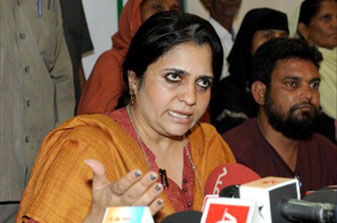New Delhi, Mar 19: The Supreme Court today referred to a larger bench the petition filed by Teesta Setalvad and her husband seeking anticipatory bail in the case of alleged embezzlement of funds for a museum at Ahmedabad's Gulbarg Society that was devastated in the 2002 riots.
The apex court, however, said that the interim order providing protection from arrest to Setalvad and her husband Javed Anand shall be extended till the larger bench takes up the matter.
 While referring the matter to a larger bench, a bench comprising Justices Dipak Misra and Adarsh Kumar Goel said the matter in hand raises several issues pertaining to concept of liberty in view of the offences enumerated in the case.
While referring the matter to a larger bench, a bench comprising Justices Dipak Misra and Adarsh Kumar Goel said the matter in hand raises several issues pertaining to concept of liberty in view of the offences enumerated in the case.
The bench also said that among the issues that needed to be discussed included supremacy of law, value of liberty, concept of regulated liberty, anticipatory bail and issue of non-cooperation during investigation by the accused.
The two-judge bench had on February 19 reserved its order in the anticipatory bail plea of Setalvad and her husband who had challenged the Gujarat High Court order denying them the relief.
The High Court in its February 12 judgement had observed that Setalvad and her husband were not cooperating in the probe and that "they cannot be armoured with full-fledged anticipatory bail when applicants did not cooperate with the investigation".
Hours after the High Court had denied them the bail, they had moved the apex court and the bench headed by Chief Justice H L Dattu had granted stay of the order and posted the matter for next day.
A bench of justices S J Mukhopadhya (since retired)and N V Ramana had asked some tough questions to Setalvad and her husband for seeking anticipatory bail.
It had extended the protection from arrest till February 19 when a new bench of Justices Dipak Misra and Adarsh Kumar Goel further extended the stay and reserved the judgement.
Setalvad and her husband have been booked by the Crime Branch of Gujarat Police on charges of cheating, breach of trust and under the IT Act, in a matter relating to the construction of "Museum of Resistance" in the Gulbarg Society in Ahmedabad which was hit by communal riots in 2002.
The bench headed by Justice Misra had clarified that non-cooperation by Teesta a social activist, and her husband into the investigation would give liberty to Gujarat police to move application for cancellation of bail.
It had also directed the accused to hand over the list of documents sought from them by the Gujarat police to carry forward its investigation into the case.
On February 28, 2002, in the aftermath of the Godhra train burning incident, armed rioters had swooped on the Gulbarg Society and killed 69 people, including former Congress MP Ehsan Jafri.
One of the riot victims from Gulbarg Housing Society, which was burnt during the 2002 post-Godhra riots, had lodged a complaint with the Ahmedabad Police against Setalvad, Anand and two NGOs run by them - Citizens for Justice and Peace and Sabrang Trust - alleging misappropriation of funds to the tune of Rs 1.51 crore.
According to the complaint, the accused persons had collected funds in the name of converting part of the Gulbarg Society into a museum and had allegedly misappropriated funds worth Rs 1.51 crore.
The accused had contended that they have been implicated in the case and were victims of political vendetta. They claimed that they were being targeted by the perpetrators of the riots.
In 2006, the social activists decided to build the 'Museum of Resistance' at the site of the Gulbarg Society. Accordingly in 2009, a part of the plot was sold to Sabrang Trust.
However in 2012, the idea of the museum was dropped as the prices escalated. The same was communicated to the society.
But, according to the complaint filed against Setalvad, funds were collected by her despite the idea being dropped.





Comments
Add new comment